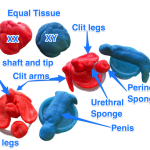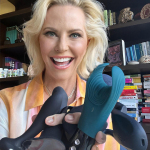Are you (or your lover) one of the 50% of Americans with an “insecure sexual attachment style?”
Attachment bonding is a growing category of psychology. Attachment-bonding is getting so much attention because it explains A LOT about our behavior—generally and SEXUALLY.
How you have parented shapes how you mature and attach to your lovers or mates in the future.
Look at the 17 ways a poorly attached child impacts one’s sex life. Perhaps you may see a bit of yourself or your sexual partner reflected in this list. If so, it may explain a LOT of confusing behaviors.
THE GOOD NEWS
If you or your partner fits this description, look on the bright side. You can get over this lack of attachment parenting and go on to have more positive feelings of sexual well-being.
Knowing that your attachment deficit is “a thing” lets you move toward resolving unmet needs for bonding so you can get to the point where you feel safe, secure, and loved.
“Secure attachers have more positive emotions during sex, more frequent sex, higher levels of arousal and orgasm, and better communication about sex.”
I recommend my holding technique, The Soulmate Embrace, as the first, best step in feeling more attachment bonding. It’s free and downloadable right now. Get your copy.

THE SOULMATE EMBRACE
Now you can let go of blaming your parents if they weren’t there for you, and you’re in the 50% of not-well-attached adults. They did the best they could with what they had.
In the 21st century, we practice compassion, not blame or bitterness. Forgive them, forget the bonding you missed as a child, and look forward. Learn how to ask for and receive the love you need, heal yourself, parent yourself, and attach yourself healthily.
I know, easier said than done—more about what you can do and read below.
17 INSECURE ATTACHMENT TRAITS
Dr. Emily Nagoski, author of
 |
Unlock Additional Members Only Content Please login or register for a Free Membership to view this content. |
She goes on to list some of the effects of insecure attachment-style parenting that affect people sexually:
(You may begin to see traits of your own, your current or past lovers in this list.)
- More negative emotions about sex
- Less frequent sexual desire
- Lower levels of arousal and orgasm
- Not as facile at giving and receiving pleasure
- They enjoy sex less
- Are less sexually self-confident
- Have anxiety-driven sexual experiences
- More likely to experience pain with sex and health risks
- Less likely to use condoms
- More likely to use alcohol or other drugs before sex
- Have higher STDs and unwanted pregnancies
- Are more likely to be involved on either side of a coercive sexual relationship
- Have sex later in life
- Have fewer non-coital behaviors
- More positive attitudes about sex outside committed relationships
- Have more one-night stands
- They are more likely to have sex to fit into a social expectation instead of just because they want to
A lack of secure attachment parenting impacts every facet of sex.
If you suspect that you are one of the 50% who did not receive secure attachment bonding, read Dr. Nagoski’s new book,
 |
Unlock Additional Members Only Content Please login or register for a Free Membership to view this content. |
Disclaimer: We frequently partner with companies providing products and services featured on our website in an affiliate relationship. We vet the products in advance to ensure they are trusted resources and recommend you research before purchasing. We welcome your feedback and recommendations. If you buy one of the products we recommend or click on one of the links in this article, we may receive a commission. Thank you for supporting us!
All information from Susan Bratton, Personal Life Media, The20, and our collective brands are personal opinions. The statements made within this email/website have not been evaluated by the Food and Drug Administration. These statements and the products of this company are not intended to diagnose, treat, cure or prevent any disease. Always seek consultation from your doctor.









3 Responses
iam not happy want wood i do my wife do not have sex with me pl help
How do you start over when you hit 72 i sure would like to know.
I love sex anal and I nit I dong have for 30 years